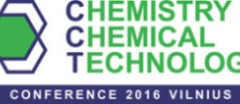 Conference „Chemistry & Chemical Technology 2016“ (CCT 2016) took place in Lithuanian Academy of Science on April 28-29, 2016. It was dedicated to the 210th anniversary of the electrolysis theory proposed by Theodor von Grotthuss, who had lived in Lithuania for many years. European Physical Society Young Minds Section of Vilnius University (EPS YM Vilnius) successfully took part in the organising by helping Lithuanian Chemistry Society with sharing the knowledge of conference management and even presenting some or at least listening to our neighbors’ presentations from the field of chemistry and chemical sciences.
Conference „Chemistry & Chemical Technology 2016“ (CCT 2016) took place in Lithuanian Academy of Science on April 28-29, 2016. It was dedicated to the 210th anniversary of the electrolysis theory proposed by Theodor von Grotthuss, who had lived in Lithuania for many years. European Physical Society Young Minds Section of Vilnius University (EPS YM Vilnius) successfully took part in the organising by helping Lithuanian Chemistry Society with sharing the knowledge of conference management and even presenting some or at least listening to our neighbors’ presentations from the field of chemistry and chemical sciences.
260 scientists from variety of countries took part in CCT 2016, moreover, a big number of young researchers were among the participants, thus it was a great chance for EPS YM Vilnius to connect and discuss future possibilities in both out-reach and research. The first day was dedicated to electrochemistry, while the second one for other areas of chemistry. The newest research was presented by known European electrochemists from Estonia, Germany, Lithuania, Poland, and Sweden. The conference chair discussed the development of the electrochemistry in Lithuania in XX century in his presentation. As mentioned before, Theodor von Grotthuss is believed to be very influential scientist who actually also had some impact in physics as well, in addition to scientific presentations one of the professors introduced the audience to Grotthuss’ works. The speakers from Vilnius University, Kaunas University of Technology, FTMC and industrial representatives presented their research in organic, inorganic, polymer synthesis, applied chemistry, nanotechnology and chemical technology. The total of 6 keynote lectures, 11 invited presentations and 12 oral presentations were given in the conference. More information can be found at the conference website http://cct2016.ftmc.lt.
Chemistry and chemical technologies are very important part of the scientific world. Great advancements have been made in recent years so huge potential for interdisciplinary research and collaboration between physicists and chemists arise. The benefits are hoped to be felt in the number of chemists participating in the international conference for physics of natural sciences “Open Readings” as well.
